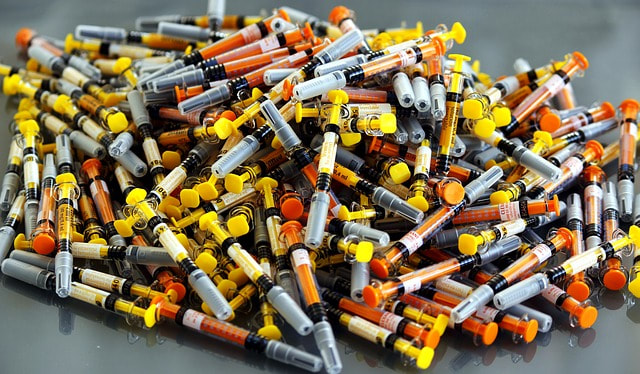|
Harm reduction models use a variety of strategies to eliminate the harmful consequences associated with substance abuse. These strategies seek to reduce morbidity and mortality associated with substance abuse for those who are not ready to quit all together. Such programs resemble a stepping stone process and allow persons who inject drugs to make gradual progress to overcome their addiction. According to the Rural Health Information Hub, “The goal of harm reduction models is to reduce at-risk, moderate and high-risk behaviors often associated with substance abuse.” One of the key principles of harm reduction practice from the Harm Reduction Coalition is, “Accepts, for better and or worse, that licit and illicit drug use is part of our world and chooses to work to minimize its harmful effects rather than simply ignore or condemn them.” This principle highlights the knowledge and acceptance that the programs put into place are not direct solutions but help assist people in taking steps towards ending their addiction. Syringe exchange programs allow persons who inject drugs to exchange used needles for new, sterile needles and syringes to reduce the risk of spreading human immunodeficiency virus (HIV). These programs also provide counselling, HIV and hepatitis B and C testing, and referrals to treatment centers. The hope of these programs is to reduce to spread of HIV and hepatitis B and C while also providing education, counseling and testing to persons who inject drugs. Even though these programs are controversial, they have drastically reduced the rate of HIV transmission and risk of hepatitis infections among injection drug users without increasing the rate of the illegal drug use. According to the Centers for Disease Control and Prevention (CDC), the use of these programs has increased during the past decade. The service provided by these programs have been misinterpreted as enabling drug users by giving them easy access to clean needles. However, the goal of these programs is to reduce the transmission of HIV and hepatitis B and C. There has been an increase in the last decade of drug injection in the United States. While the drug usage has not increased, people who started off with the oral analgesics have transitioned to injecting prescription opioids and heroin. “The big picture here is that we’ve had a lot of progress reducing HIV infections spread by needles and we’re at risk of stalling or reversing that progress,” said CDC Director Tom Frieden in an interview with The Washington Post. As a result of the opioid epidemic, he said, “more people appear to be injecting drugs, more people are sharing needles, and there are more places not covered by syringe service programs.” There is a need to increase the number of comprehensive harm reduction/syringe exchange programs in the rural areas of Virginia. According to the CDC, “Substantially fewer syringe service programs were located in rural and suburban than in urban areas, and harm reduction services were less available to persons who inject drugs outside urban settings.” According to the CDC, “Because increases in substance abuse treatment admissions for drug injection have been observed concurrently with increases in reported cases of acute Hepatitis C infection in rural and suburban areas, state and local jurisdictions could consider extending effective prevention programs, including syringe service programs, to populations of persons who inject drugs in rural and suburban areas.” A law passed by the General Assembly in 2017 allows 55 localities around the state to create comprehensive harm reduction programs. According to the Virginia Department of Health, the state has only approved two sites so far and only one is up and running. The first program in Virginia began in Wise County. The program has served dozens of people since opening in the summer of 2018 and has collected more needles than it distributed. The second location will be running out of the free clinic, Health Brigade, in Richmond. These programs are necessary to provide persons who inject drugs with clean needles in order to prevent the spread of HIV and hepatitis B and C. In addition, these programs provide these people with the education, counseling, and testing they need in order to quit their drug addiction. Megan SaetreMegan is a Communications Assistant at the Virginia Rural Health Association. The VRHA has offices in Blacksburg, Luray, and Big Stone Gap. Its mission is to improve the health of rural Virginians through education, advocacy, and fostering cooperative partnerships. The views expressed above are solely the author's and are not endorsed by the Virginia Policy Review, The Frank Batten School of Leadership and Public Policy, or the University of Virginia. Although this organization has members who are University of Virginia students and may have University employees associated or engaged in its activities and affairs, the organization is not a part of or an agency of the University. It is a separate and independent organization which is responsible for and manages its own activities and affairs. The University does not direct, supervise or control the organization and is not responsible for the organization’s contracts, acts, or omissions. Referenceshttps://www.cdc.gov/mmwr/preview/mmwrhtml/mm6448a3.htm
https://www.washingtonpost.com/news/to-your-health/wp/2016/11/29/white-rural-drug-users-lack-needle-exchange-programs-to-prevent-hiv-infections/?utm_term=.7947b55f8034 https://www.nejm.org/doi/full/10.1056/NEJMp1507252 https://www.ruralhealthinfo.org/toolkits/substance-abuse/2/harm-reduction/syringe-services http://www.wvtf.org/post/one-year-later-wise-county-needle-exchange-only-state#stream/0 https://harmreduction.org
0 Comments
Your comment will be posted after it is approved.
Leave a Reply. |
Categories
All
Archives
April 2022
|
ADDRESSVirginia Policy Review
235 McCormick Rd. Charlottesville, VA 22904 |
|
SOCIAL MEDIA |
